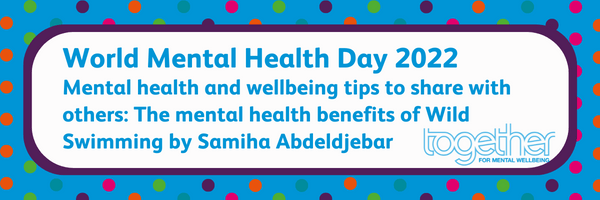WMHD 2022 – Blog on the mental health benefits of Wild Swimming by Samiha Abdeldjebar

World Mental Health Day takes place on 10 October and the theme for 2022, as set by the World Health Organisation, is ‘Make mental health & well-being for all a global priority’. We see this theme as focussing on increasing access to knowledge and support relating to mental health wherever possible globally and thought about how we could contribute.
As we value lived experience as an organisation, with our core principle being service user leadership, we thought we could help by inviting our staff, volunteers and people who use our services to share their knowledge and insight through tips that have worked for them in supporting their mental wellbeing. We hope this is a way we can help others by sharing the understanding people have gained from their own experiences and our overall question was:
- What are some of your tips for aiding your mental health and wellbeing you’d want to share with others experiencing mental distress?
Considering a mental wellbeing tip that helped her, Peer Support Coordinator at our Willow Tree House Accommodation Service, Samiha Abdeldjebar describes the impact wild swimming has had for her:
The Water’s Lovely…
How wild swimming helped me get through the winter
It is a bright, sunny afternoon in early December and I am standing on

the long sweep of Sandbanks beach. Small blue-grey waves are lapping onto the sand. This side of the sand-spit is sheltered from the brisk icy wind, which nearly blew me off my feet when I was walking along the marina. I have planned a swim during my weekend break in Poole; yesterday came and went and I still haven’t stepped into the water. A deep longing inside me is laced with fear.
In a few hours, I will be leaving Dorset, back on the road to my home in Wiltshire. As I look to the horizon, still hesitating, I hear laughs and shrieks on my left – it is a young boisterous couple enjoying the beach, as am I, and the legions of families and dog walkers. The couple have thrown off their clothes and are running into the sea, frolicking in the little breakers. Their excitement is infectious. Something shifts inside me, and I know that the time is now. Right now. Suddenly, I am desperate to be in that water. I pull my towel out of my rucksack.
It is the end of February – the bleak, gunmetal clouds have just parted and given way to streaming winter sunshine, making the water dance and sparkle. I am floating in the middle of Vobster Quarry, with twenty metres of darkening depth beneath me. The water temperature is six degrees; it cuts sharp like thousands of tiny knives. I look around me, at the rocky cliffs, the bare trees, the glistening ripples. I can’t believe I’m swimming outdoors in the heart of winter, dressed only in my swimsuit; but the icy sensation, verging on pain, is a clear indication that this is not a dream. In a couple of minutes, I will be swimming back to dry land, to start the process of re-warming my numb body. Endorphins will flood my brain with euphoria, and I will start chattering excitedly about how wonderful this is, how I love the thrill of the cold. I will be filled with a burst of energy, inhabited by the spirit of the water – its vitality and magical powers of renewal.

I have loved outdoor dipping and swimming ever since I was a small child. Since then, I’ve gone in everywhere I could – from the Mediterranean to Windermere Lake, Loch Etive to the Irish Sea. Yet I had never swum through the coldest months – until last year, the winter of 2021-22. I took it on as a charity challenge, mostly to raise funds for a cause I cared about, but also as a form of cast-iron commitment: if people were donating money to support my endeavour, then there was no chance I could let them down by chickening out.
Last winter was difficult – two years of pandemic had finally got the better of me. I was chronically exhausted, apathetic, unmotivated – I was struggling to manage my anxiety and bipolar disorder. After months of social isolation, health fears, uncertainty and the constant wall of grim news, I was languishing; not ill, not quite, but I seemed to have lost a vital part of myself, and didn’t quite know how to find my way back to it.
If it hadn’t been for my weekly winter swims, would I have been able to come back from this strange affliction? How long would it have taken? Those minutes in the chilly waters of the river or the quarry, reconnected me with the intensity of what I used to have, could still have – excitement, wonder, playfulness, joy.
I don’t claim that it was easy. On the mornings of my swims, my insides would twist with something akin to terror. I was taken over by a primal fear – after all, immersion in winter when the air is cold, the water colder still, goes against all our instincts. A voice inside you screams: “NO!”, then nags “why, oh why am I doing this?”. Breaking that barrier felt like a triumph. At a time when I was feeling weak and disappointed in myself, the act of braving the cold gave me back my sense of self, some measure of strength, agency and self-belief. If I could immerse myself in that dark, freezing abyss, then I could get through the next few days. It was like having a hidden superpower.
Winter swimming also gave me a unique bond with nature. At the turn of the year, we tend to retreat from the natural world. We hide from the cold and the rain, hunker down in our homes with blankets, books and boxsets; but in the moment when we dare to shed our clothes and sink into the icy water, we turn, not away from the natural world, but towards it. Not only do we face it head-on, but we merge with it. We are at one with the sky and the sun, and all the water creatures for whom winter is home: the ducks, and the grebes, and the perch rising from the depths to swim with you on the surface. A primitive force within us is unleashed, a call is answered; we feel connected, powerful and free.
I am far from the only one to have discovered the unique power of swimming through the year – I’m part of a community of millions across the world. Outdoor or “wild” swimming has become a phenomenon in recent years, as rather than using an indoor pool, people head to their nearest beach or river. The Outdoor Swimming Society’s membership figures exploded during the pandemic. The health benefits of outdoor swimming, particularly in colder temperatures, have been recognised since Roman times. Speak to any cold-water swimmer, and they will wax lyrical about what wonders it has done for their wellbeing – their general health, their immunity, their energy levels. Scientists are still trying to establish if there is any tangible evidence that cold water positively impacts health outcomes. It is still not clear whether the benefits described by swimmers come from the effect of the cold itself; or from a placebo reaction; or simply from the exhilaration of overcoming a challenge, of exercising in a beautiful natural spot and sharing this moment with like-minded people. There is no doubt that our wellbeing is boosted, judging from the wealth of anecdotal evidence.
Many swimmers, like me, describe the positive impact on mental health. The rush of hormones such as dopamine and endorphins act like a potent antidepressant. The icy sensation helps us deal with anxiety and panic attacks. As we submerge our bodies in cold water, our heart rate and blood pressure rise, and this leads to a reaction very similar to hyperventilating – we must then regain control of our breathing, and gradually slow it down. This trains us to react more calmly in stressful environments, when we would previously have gone into full fight-or-flight mode. Many of us also find we have a better night’s sleep after our winter dips or swims.
And finally there is the finding of a community; there are now outdoor swimming clubs or groups all over the country, one of which you might come across while on a walk along the beach – they will be huddled together in their dry robes after a dip, sipping hot chocolate, cheeks flushed with contentment. It is probably one of the most body-positive and inclusive communities you will ever find, welcoming swimmers of all ages, body shapes and abilities. One of the great boosts for my mental health is seeing a woman in her 80s set off at a brisk pace into the river on a winter morning, then giggle delightedly with her mates afterwards. I simply can’t think of anything more life-affirming.
Has all this tempted you to give it a go? If so, now is a good time to start. The temperatures have only just started to drop, and many people find autumn is the most wonderful time of year for wild swimming. The water is still bearable for the fair-season swimmer (water temperatures are warmer in the autumn than in the spring), and most of the crowds have left after the summer. Leaves float on the surface, trees are all aglow around you, and with the return of the quiet, you are more likely to catch sight of a kingfisher, or who knows, even an otter. If you continue to swim, you will acclimatise as the temperatures keep dropping and might very well find you want to keep going until Christmas…and beyond.
Thank you to Samiha for taking the time to write this blog. She has also been kind enough to provide further guidance on cold water swimming:
Before you start: a few things you need to know…
Safety:
Cold water swimming can be wonderful, but it also carries considerable risks, if not done safely: these are extreme conditions for the body to find itself in. The main risks are cold water shock, hypothermia and aftershock, all of which can be fatal. These can be prevented with a few simple precautions, which include choosing your location carefully, not swimming alone, getting in slowly, being aware of your own abilities, knowing when to leave the water, and warming up properly afterwards. Taking into account the weather conditions, as well as how you are feeling at the time (tired? hungry? run down?) is also really important. Above all, follow your instinct: if it doesn’t feel right, don’t do it. It is key to be mindful that this activity isn’t for everyone; if it’s too unpleasant, or you don’t enjoy it, don’t force yourself; and never force or pressure others either.
There is great safety advice on the Outdoor Swimming Society website and Facebook group. Immerse Hebrides also has excellent advice, as well as online courses on cold water and safe sea-swimming. Water quality is often a concern (we’ve all heard the stories about the recent sewage scandals) – Surfers Against Sewage has great resources on this, including an interactive map pinpointing recent outflows. Many “managed venues” (such as some lakes, quarries and the famous Hampstead Heath ponds in London) have lifeguards, so it’s always worth asking them for guidance, as well as from more seasoned swimmers.
Kit
From autumn to spring, many outdoor swimmers start wearing a wetsuit to allow for longer swims and alleviate the sharpness of the cold sensation. Others, like me, choose to stay in “skins” – which basically means wearing only a swimsuit – because we find it adds to the intensity of the experience, and there is something both sensual and exhilarating about the icy feel of the water. If you opt for the latter, I strongly recommend investing in neoprene socks & gloves and wearing a woolly hat – they will make your swim far more enjoyable. Tow-floats are also highly recommended as a safety aid, especially in deep water; and dry-robes (though expensive) are a very useful addition – I definitely plan to invest in one this year. Bring plenty of towels and warm layers to put on afterwards, as well as a snack and a flask with a hot drink.
Resources
There are now countless books and TV programmes about outdoor swimming. Here are a few I particularly enjoyed:
Books:
- Waterlog by Roger Deakin – utterly fascinating and beautifully written, it is a seminal piece of nature writing which re-kindled the passion for wild swimming in the UK.
- The Natural Health Service by Isabel Hardman – an exploration of the benefits of nature on mental health; includes a chapter on wild swimming.
- At The Pond: Swimming At The Hampstead Ladies Pond – a collection of short pieces by a diverse group of woman writers, looking at wild swimming from the angles of different backgrounds and identities, thus reflecting the richness of the experience.
TV:
- Wild Swimming with Alice Roberts: https://youtu.be/_TlhpGZ7OuU
- The Merthyr Mermaid: BBC iPlayer – The Merthyr Mermaid


